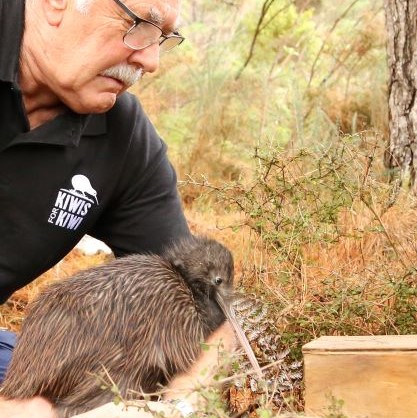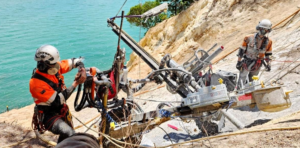Up to 25 kiwi will be returning home to a sanctuary in Te Mātā at the end of March.
The birds are part of the Operation Nest Egg programme, a national initiative run by Save the Kiwi to rebuild New Zealand’s wild kiwi population.
Thames Coast Kiwi Care runs the programme in Te Mātā, covering 5000 hectares of private and Department of Conservation land behind Te Mātā, Tapu and Waikawau.

Kiwi eggs from the sanctuary are taken to Auckland Zoo for hatching, with the chicks then raised on predator-free Rotoroa Island.
“They grow up big and strong there, in the life of luxury with no predators, and then they’re ready to come back to the Thames Coast when they’re technically big enough to fight off a stoat,” co-ordinator Sheena Beaton said.
Sheena was excited for the 10-day muster to trap and return the kiwi.
“It’s our biggest muster of kiwi off the island to date,” she said.
“It’s not guaranteed that they’ll catch them all because they can be elusive little critters, [but] there is potentially 25 that they can bring home.”
Kiwi numbers have been increasing steadily in Te Mātā since the programme began. There are currently about 250 birds in the area.
“When [we] started in 2006 there was an estimated only 28 birds total up in Te Mātā – you know, that’s nearly the whole population that we started with that are coming back.”
Nationally, kiwi numbers are declining by 2 per cent a year. However, Sheena said the programme’s bird numbers had increased by roughly 15 per cent a year.
The growth in numbers is largely due to extensive predator control efforts, as well as the breeding programme, she said.
“We’ve been just continually controlling mainly mustelids in there – stoats, ferrets, weasels – that’s been our target species for the last 17 years. We’ve got 60 volunteer trappers that go out every two weeks and check the traps,” Sheena said.
“Without that predator control, kiwi have a very slim chance of surviving. Over 95 per cent of kiwi don’t survive if there’s no predator control. So it just shows how important that aspect of it is for sure.”
Thames Coast Kiwi Care are celebrating the return of the kiwi with a fundraising dinner and auction at the Tapu Hall on April 1, where guests may have the opportunity to meet a kiwi if one has been caught that day.
The rest of the birds will be released quietly back into the sanctuary – no fanfare, just a welcome return to their home.
Details: Thames Coromandel Kiwi Care celebration dinner and fundraiser, April 1 from 4.30pm at Tapu Hall.
Tickets are available from thamescoastkiwicare.org or Carson’s Bookshop.
By ALICE PARMINTER, Public Journalism funded by NZ on Air.





